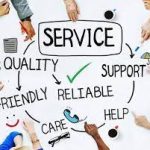
Customer service requires anticipating and meeting a customer’s needs quickly and efficiently. Representatives must possess strong empathy skills while speaking in a friendly, personalized tone.
Representatives should understand how their actions impact customers; for instance, when an email comes through from someone asking about returning an item, reps must respond swiftly and professionally.
1. Listening Skills
Customer service representatives must have the ability to listen carefully and respond accordingly when dealing with customers, in order to validate customer frustrations and guarantee high levels of customer satisfaction with service received. Furthermore, effective listening skills help employees provide fast and precise solutions to customer problems.
Customer service agents who want to enhance their listening skills should practice by not interrupting customers, maintaining eye contact and asking pertinent follow-up questions during phone calls. Furthermore, customer service agents should show empathy towards their customers by showing that they care for them as people.
Customers’ voices must be heard; otherwise, they could go elsewhere and lose business due to poor customer experience and potential lost sales.
2. Problem-Solving Skills
Customer service representatives should have the ability to address issues quickly by phone, chat, or email. They must respond to inquiries quickly while adhering to call handling scripts and being proficient with various software tools to effectively serve their customers.
Customers expect their service providers to think critically and creatively when devising solutions to ensure all customer issues are fully addressed, and this may involve employing various ideation tools such as SCAMPER (Substitute, Combine, Adapt Modify Eliminate Reverse). Also essential are skills like lateral thinking.
Maintain a calm and composed demeanor when customers present them with urgent or emotional problems, and possess sufficient typing speed and accuracy so they can respond swiftly to customers via chat or email.
3. Time Management
Effective time management techniques can make all the difference in high-pressure environments. Call center agents who have mastered them often experience higher rates of resolved customer issues, benefitting both business bottom line and agent satisfaction.
“Chunking,” or breaking tasks down into smaller, manageable parts, is one effective strategy for increasing productivity. This technique helps professionals prioritize tasks while simultaneously cutting out activities that don’t directly contribute to customer or revenue growth.
Implementing clear policies regarding log in/log out times and meal breaks may also help enhance time management, helping agents avoid overworking themselves and compromising quality; setting expectations clearly with customers; this will reduce frustration while increasing customer satisfaction.
4. Patience
Patience refers to being able to endure irritation, delay and pain with calm. It requires looking at things from a long-term perspective rather than immediate gratification. While practicing patience may be challenging at times, you can monitor for signs that your impatience may be increasing by becoming irritable or angry and taking steps such as high blood pressure management or headache treatments.
Patience is essential in customer service; being flexible with your company’s guidelines is one way of practicing it. For instance, if certain tickets take longer to resolve than others do, try refining processes that enable faster resolution times of customer issues quickly and efficiently.
5. Flexibility
Customer Service refers to the support you offer customers before, during, and after their purchases of your products or services. It entails listening to their needs, being sympathetic toward them, resolving any issues related to product availability, payment, returns or technical support in a prompt manner – essential factors for customer retention, business expansion and good reputation management.
Flexibility is an indispensable trait of customer service representatives. It involves being able to tailor strategies depending on the dynamics of each situation and adapt quickly and seamlessly as conditions shift. For instance, when customers complain of long wait times on the phone, offering to call back or text instead can often alleviate their concerns or you could offer discounts or squeeze them in earlier for appointments if applicable.












